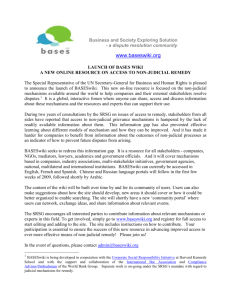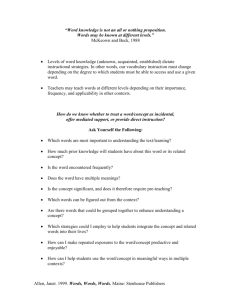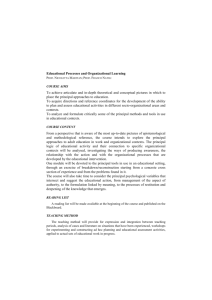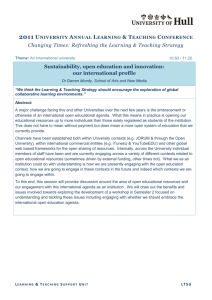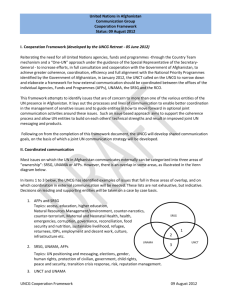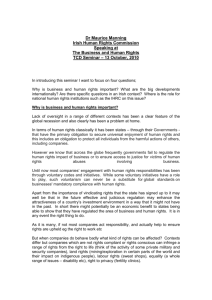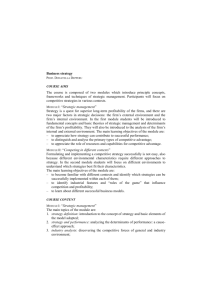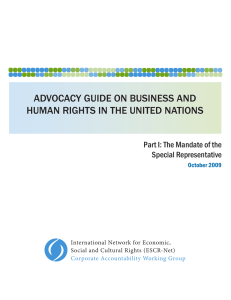Setting Boundaries: Clarifying the Scope and Content of the
advertisement
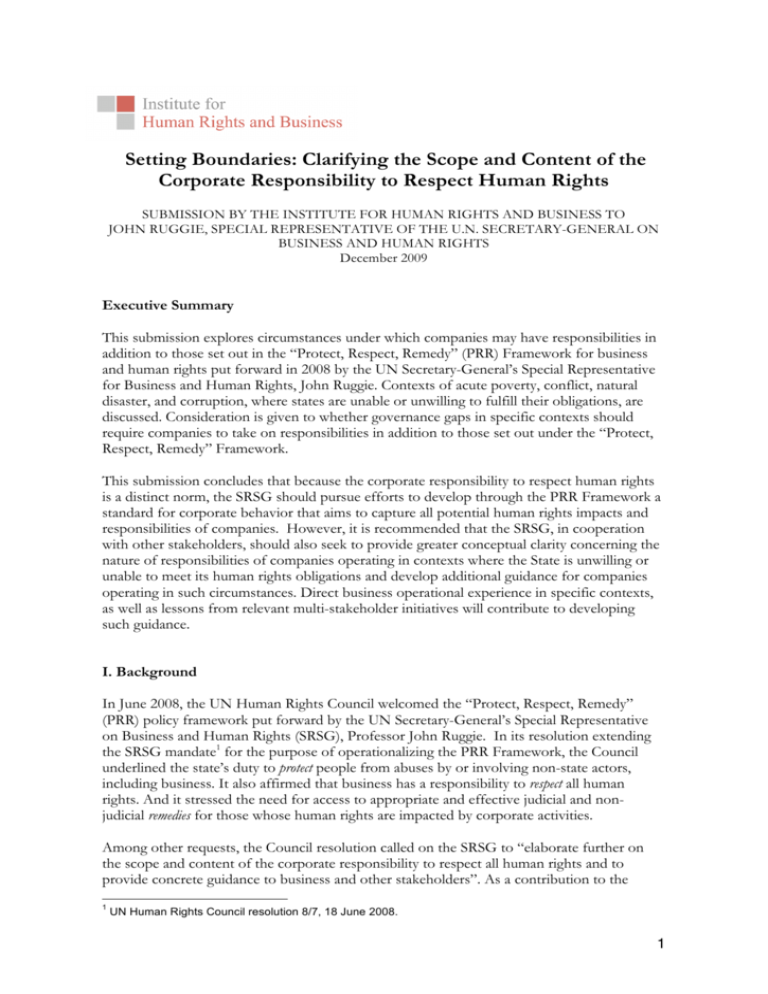
Setting Boundaries: Clarifying the Scope and Content of the Corporate Responsibility to Respect Human Rights SUBMISSION BY THE INSTITUTE FOR HUMAN RIGHTS AND BUSINESS TO JOHN RUGGIE, SPECIAL REPRESENTATIVE OF THE U.N. SECRETARY-GENERAL ON BUSINESS AND HUMAN RIGHTS December 2009 Executive Summary This submission explores circumstances under which companies may have responsibilities in addition to those set out in the “Protect, Respect, Remedy” (PRR) Framework for business and human rights put forward in 2008 by the UN Secretary-General’s Special Representative for Business and Human Rights, John Ruggie. Contexts of acute poverty, conflict, natural disaster, and corruption, where states are unable or unwilling to fulfill their obligations, are discussed. Consideration is given to whether governance gaps in specific contexts should require companies to take on responsibilities in addition to those set out under the “Protect, Respect, Remedy” Framework. This submission concludes that because the corporate responsibility to respect human rights is a distinct norm, the SRSG should pursue efforts to develop through the PRR Framework a standard for corporate behavior that aims to capture all potential human rights impacts and responsibilities of companies. However, it is recommended that the SRSG, in cooperation with other stakeholders, should also seek to provide greater conceptual clarity concerning the nature of responsibilities of companies operating in contexts where the State is unwilling or unable to meet its human rights obligations and develop additional guidance for companies operating in such circumstances. Direct business operational experience in specific contexts, as well as lessons from relevant multi-stakeholder initiatives will contribute to developing such guidance. I. Background In June 2008, the UN Human Rights Council welcomed the “Protect, Respect, Remedy” (PRR) policy framework put forward by the UN Secretary-General’s Special Representative on Business and Human Rights (SRSG), Professor John Ruggie. In its resolution extending the SRSG mandate1 for the purpose of operationalizing the PRR Framework, the Council underlined the state’s duty to protect people from abuses by or involving non-state actors, including business. It also affirmed that business has a responsibility to respect all human rights. And it stressed the need for access to appropriate and effective judicial and nonjudicial remedies for those whose human rights are impacted by corporate activities. Among other requests, the Council resolution called on the SRSG to “elaborate further on the scope and content of the corporate responsibility to respect all human rights and to provide concrete guidance to business and other stakeholders”. As a contribution to the 1 UN Human Rights Council resolution 8/7, 18 June 2008. 1 SRSG’s ongoing work in this area, the Institute for Human Rights and Business (IHRB), in collaboration with the UN Office of the High Commissioner for Human Rights (OHCHR), convened a brainstorming session 2 in Geneva in September 2009, with the aim of assisting efforts to clarify the scope and content of the “corporate responsibility to respect all human rights”, focusing in particular on whether there may be situations and specific circumstances in which companies have responsibilities in addition to the baseline responsibility to respect human rights, as set out in the PRR Framework. Experts who were present at the brainstorming session in Geneva took part in their individual capacity. This submission does not attempt to summarize the Geneva discussion though it does draw from comments made during the meeting. Instead, it seeks to provide analysis and proposals on some of the next steps which should be considered as part of the SRSG’s ongoing work to develop further recommendations and guidance concerning the corporate responsibility to respect human rights for governments, companies and other actors. The views expressed here are solely those of the Institute for Human Rights and Business, and do not necessarily reflect the thinking of OHCHR, the SRSG, or the participants at the brainstorming session. IHRB welcomes feedback. II. “Respect” within the Protect, Respect, Remedy Framework The SRSG, in expanding on the three inter-related principles which make up the PRR Framework, has stressed that the corporate responsibility to respect human rights exists independent of State duties and that it constitutes “a baseline expectation” for all companies. The SRSG has explained that this responsibility essentially means that a company should act with due diligence to avoid infringing the human rights of others and has suggested that its cornerstone is the concept of due diligence. In the context of human rights, due diligence means that companies should take all necessary steps to become aware of, prevent and address the adverse human rights impacts of their activities. Furthermore, there is clear expectation, and obligation, that companies will not be complicit in abuses committed by others – state or private actors. The clearest examples are drawn from zones of conflict, and a growing body of jurisprudence from the U.S. Alien Tort Statute and judgments of international tribunals, as well as policy work done by several organizations. At minimum, companies should not contribute to, or benefit from, abuses, and should undertake due diligence to avoid such involvement. The SRSG’s conceptualization of the corporate responsibility to respect human rights includes these aspects. While this approach has been broadly welcomed, some organizations and experts have pointed out that because the notion of respect, as understood in international human rights law, has a definite, settled meaning - part of the well-established State-based framework of duties to “respect, protect and fulfill” (RPF) – there is a need to avoid confusion as work proceeds to clarify the scope and content of the corporate responsibility to respect human rights. Some suggest that more consideration should be given to whether corporations have responsibilities analogous to state duties to protect and fulfill rights. Others point out that because the corporate responsibility to respect as set out in the PRR Framework is a distinct norm, it should be clarified on its own terms and that any potential exceptions to the norm should be identified. The SRSG has himself indicated the latter may potentially be necessary 2 Participants: Charles Abrahams, Andrew Clapham, Patrick Doris, Auret van Heerden, Sarah Joseph, Jody Kollapen, David Petrasek, Ian Seiderman, Mark Taylor and Claude Voillat. Gerald Pachoud from the SRSG’s team and Lene Wendland from the Office of the High Commissioner for Human Rights also participated in the discussion. Scott Jerbi, John Morrison, and Salil Tripathi represented IHRB. 2 in referring to circumstances in which corporations may have responsibilities “beyond respect”.3 It should be noted that the “respect, protect, fulfill” paradigm applicable to States is familiar and intuitive to the human rights community. When human rights experts suggest that the SRSG needs to look “beyond” respect, they are generally referring to the meaning of respect within this paradigm because as understood in human rights terms, respect generally suggests minimum standards of non-infringement. States’ positive obligations are widely seen to be embedded in the other two terms within the paradigm – protect and fulfill. While not explicitly stated as such, it has been suggested that there is an implied hierarchy of obligations within the State-based framework. In other words, a primary duty of States – to respect – implies that under no circumstances should they harm human rights; States should also protect individuals from harm caused by others; and – in the context of economic, social, and cultural rights – States should take steps to progressively realize rights towards fulfillment. The notion of progressive realization acknowledges that some economic, social and cultural rights may not be realized to the fullest extent immediately. Thus the fact that the SRSG has highlighted the “corporate responsibility to respect” – drawing as well from similar references in other international instruments including the International Labour Organization’s Tripartite Declaration of Principles Concerning Multinational Enterprises and Social Policy, the OECD Guidelines for Multinational Enterprises and the UN Global Compact - as a “baseline responsibility” for corporations, may have unintentionally reinforced comparisons between the scope of respect under the State-based paradigm and the corporate responsibility to respect as understood in the PRR Framework. However, the intention to develop through the PRR Framework a standard for corporate behavior that aims to capture all potential human rights impacts and responsibilities of companies4 should be pursued. It will, however, be critical to ensure that as this work develops clear distinctions are made between the operationalization of the corporate 3 In his report A/HRC/11/13, 22 April 2009, the SRSG notes that: “Operating conditions may impose additional requirements on companies, for example, the need to protect employees in conflict-affected areas, or from violence in the workplace. But this is more appropriately considered a specific operationalization of the responsibility to respect, and not a separate responsibility altogether. More than respect may be required when companies perform certain public functions. For example, the rights of prisoners do not diminish when prisons become privatized. Here, additional corporate responsibilities may arise as a result of the specific functions the company is performing. But it remains unclear what the full range of those responsibilities might be and how they relate to the State's ongoing obligation to ensure that the rights in question are not diminished.” 4 See Report of the Special Representative of the Secretary-General on the issue of human rights and transnational corporations and other business enterprises, John Ruggie, April 2008, (A/HRC/8/5) where the SRSG says: Some stakeholders believe that the solution lies in a limited list of human rights for which companies would have responsibility, while extending to companies, where they have influence, essentially the same range of responsibilities as States. For reasons this report spells out, the Special Representative has not adopted this formula. Briefly, business can affect virtually all internationally recognized rights. Therefore, any limited list will almost certainly miss one or more rights that may turn out to be significant in a particular instance, thereby providing misleading guidance. At the same time, as economic actors, companies have unique responsibilities. If those responsibilities are entangled with State obligations, it makes it difficult if not impossible to tell who is responsible for what in practice. Hence, this report pursues the more promising path of addressing the specific responsibilities of companies in relation to all rights they may impact. (Emphases added). 3 responsibility to respect human rights and the State-based “respect, protect, fulfill” paradigm to avoid confusion and unnecessary disagreements. It is evident that the SRSG does not imply “respect” to mean a call for minimal, or no action on the part of companies. As the SRSG has indicated repeatedly, to live up to the corporate responsibility to respect, companies are expected to undertake a range of proactive measures such as establishing policies, conducting due diligence, tracking performance, and putting in place grievance mechanisms to deal with situations when things go wrong. It is also clear that companies which fail to meet the corporate responsibility to respect human rights will face a range of consequences. These currently take the form of adverse publicity, criticism in the court of public opinion, and in some cases, lawsuits. The challenge remains, however, to clarify more precisely the scope of the corporate responsibility to respect human rights and to determine whether situations exist where there may be responsibilities in addition to this baseline responsibility which apply to specific companies or to those operating in specific contexts. This is necessary in view of the ambiguity surrounding the meaning of "respect" as set out under the two frameworks: PRR and RPF. The next section seeks to address these issues. III. Beyond Respect? The SRSG has raised the question of whether companies may have responsibilities in specific operating contexts in addition to those covered by the corporate responsibility to respect human rights. Is it necessary to identify such circumstances, and if so, what are those additional responsibilities? Or instead should the focus be on situating all possible scenarios squarely within the framework and scope of the corporate responsibility to respect human rights? In addressing these questions, two areas in particular require further discussion and reflection: when a company performs public functions – an issue the SRSG has addressed in some measure – and when a company operates in an area where the state is incapable, or unwilling, to perform its functions. The notion of a “public function” is itself problematic. Many functions that were traditionally performed by States are today being carried out by non-state actors – through turn-key contracts (the so-called ‘build-operate-own-transfer’ model), public private partnerships, and outright privatization. Running prisons, generating electricity, providing water supply, broadcasting news, and other infrastructure projects – in all these areas, the private sector has increasingly been playing a role in owning, operating and managing these functions. Other primarily private functions – like providing access to Internet services – have huge public consequences as well. In some of these instances, the company is an agent of the State, with the State being the principal. The company acts with the authority of the State. Some of this authority may be granted through a charter, or by passing an enabling law. Some of the authority may be derived from past activities that the state undertook, and which the company is expected to continue to undertake. For example, Universal Service Obligations, to which water utility companies are expected to adhere, are codified forms of obligations which articulate clearly the obligations the company, as the State’s agent, is expected to undertake. 4 The company as “agent of the State” – or the notion of “agency” - is different from discussions concerning corporate “capacity”. Agency is usually drawn from a legal agreement or understanding. Capacity, on the other hand, may include circumstances in which the State’s authority has not been passed on formally to the company, but instead where the company is in effect acting “on behalf of the State”, particularly in the context of States that are unwilling or unable to perform certain functions such as under the specific circumstances discussed below. This meaning of capacity – to act on behalf of – is distinct from, and should not be confused with another meaning of capacity – of being able, because of available resources, in cash or kind. Where does that leave the notion of “public functions”? As actions of private entities have public consequences and activities traditionally understood as publicly-run are increasingly performed by private actors, any formulation that refers to ‘public purpose’ would be difficult to define precisely. Rather than focusing on ownership or stated purpose – public or private – a more helpful and pragmatic approach, as the SRSG’s human rights due diligence process suggests, may be to look at the scope of activities of a company and their effects. Where there are circumstances under which a company’s activities are tied closely with the fulfillment and realization of specific rights - for example, companies running healthcare facilities, food distribution, water provision, power generation or telecommunication providers - it seems reasonable, at minimum, to consider further whether companies involved in these or other services have responsibilities beyond the scope of the corporate responsibility to respect human rights. The following sections reflect on a number of circumstances where exploration of corporate responsibilities in addition to the PRR Framework’s baseline responsibility may be warranted. A. The Absent State State inability to meet human rights obligations may be due to many reasons. These include a lack of resources, the presence of conflict, or the impact of a natural disaster. There are already broadly held ‘social expectations’ that large companies have a role to play in society by acting in a responsible manner and these ‘social expectations’ include the expectation that companies will respect human rights. In these contexts, those who argue for companies to respond to social expectations suggest that they have some undefined level of additional responsibilities. Though international human rights law does not require action on a company’s part, there is often a strong moral basis for arguing that the company should do more and in some cases may be required to do so under national laws. How should such cases be addressed in the context of the corporate responsibility to respect human rights? Looking briefly at the three examples below may provide further insights into potential next steps. 1. Inability: The Resource Dimension Large corporations operating in communities beset by wide-spread hunger or disease, increasingly face calls for some level of engagement in support of the public good. The SRSG has indicated that although such actions are important, they do not fall within the framework of the corporate responsibility to respect human rights. Nevertheless operating in locations where extreme poverty is experienced by significant portions of the population would require particular attention as part of any corporate human rights due diligence processes. Where a company found that its actions may impact negatively – either directly or indirectly – on 5 poverty in a given context, there would be cause for action to prevent and mitigate as part of the corporate responsibility to respect human rights. Consider a situation where a corporation’s capacity in a specific operational context aligns directly with an immediate and life-threatening societal need. Further, for sake of argument consider in this situation that there is no effective State intervention to address the need for a sustained period of time, leaving local populations vulnerable. Inaction on the part of the company in such a situation, where it was in a position to be of some help, would result in the life-threatening social need remaining unaddressed. In such a context, it seems reasonable to conclude that to fulfill the corporate responsibility to respect human rights responses by companies might include actions of a kind normally undertaken by the State. If such examples of a ‘fulfilling’ role within the corporate responsibility to respect in relation to extreme poverty do exist, it will be important to undertake the difficult but vital work to clarify this role, recognizing that it should be constrained in time and location. 2. Inability: The Conflict Dimension Companies have the responsibility to respect human rights wherever they operate – and this responsibility includes not contributing to or benefiting from conflict, and not being party to abuses committed during conflict. The initiative by the SRSG to engage key governments in addressing the role of corporations in conflict situations and to develop legal and administrative measures to prevent and address violations in such situations is a welcome development. Business operations in conflict zones raise many challenging questions concerning the scope of the corporate responsibility to respect human rights. There are multiple examples of companies taking on additional responsibilities beyond their immediate operations when present in such contexts. As the SRSG engages with governments on this issue it will be important to study the diverse experiences of companies operating in such contexts including those delivering services, maintaining civilian infrastructure, and conducting regular business activities and to encourage a process through which agreed principles and practical guidance to companies operating in such high-risk zones can be developed. 3. Inability: The Natural Disaster Dimension A severe temporary dislocation – like a natural disaster – can have a devastating effect on some countries. Consider an earthquake (Iran in Dec 2003, Kashmir in 2005, China in 2008), a tsunami (Sri Lanka, Indonesia, and elsewhere in the Indian Ocean in Dec 2004), floods (Mozambique in 2000), cyclone (Myanmar in 2008), or drought (India in 2009). In these situations, the State has to mobilize resources on a massive scale to protect people in distress. In certain areas, the State’s infrastructure may have been destroyed completely, or its capacity stretched. In such contexts, companies still in a position to operate may be looked to for assistance in roles not normally understood to be within their responsibilities, and which may include providing essential services. For example, a company with a functional power plant may be expected to provide electricity to villages which have lost their source of power. Similarly, a company with access to drinking water supply may, for a limited period, be called on to provide water to villages experiencing floods. Companies may also be called upon to make their vehicles available to transport victims of an earthquake to safe zones. Again, these are limited and time bound circumstances and do not suggest that State obligations should shift 6 or change. They do, however, present real world challenges which merit further discussion and guidance. B. The Unwilling State: Lack of accountability and/or corruption Not all States consider the interest of their population as paramount, nor do all government officials act in the best interests of their people. A significant number of States routinely perpetrate egregious violations of human rights. Some States discriminate within their own borders, diverting investments and assistance to parts of the country from where they derive political support. Some donor countries have helped establish multi-stakeholder initiatives, like the Extractive Industries Transparency Initiative (EITI), to address such concerns. Companies operating in such contexts often face calls from their home governments, or civil society constituencies in their home states, to do more to improve the human rights situation, and to act with a higher degree of responsibility in these states. However, beyond the experience of various voluntary initiatives, consensus around what actions should be expected of companies when operating in such contexts includes a relatively limited range of issues. As part of the further operationalization of the corporate responsibility to respect human rights there is a need to examine the role of companies which have participated in efforts to address widespread corruption and to draw lessons from initiatives such as the EITI. Developing clear guidance for companies operating in such contexts as part of the corporate responsibility to respect human rights is a daunting but necessary task. This calls for greater due diligence to ensure that the company respects human rights, including not contributing to, or benefiting from, abuses. In other words, that it is not complicit in rights violations. IV. Understanding the Shifting Nature of Responsibility and Governance It is important to acknowledge that the discussion in the previous section is set within a broader context as doing so raises a number of further questions concerning possible future actions. Since the end of the Cold War, a growing number of governments have privatized many traditionally State implemented functions. This includes the delivery of essential services such as water or electricity. Some States have entered into contracts with private companies to build infrastructure, operate businesses, or offer services, which were traditionally State roles – including electricity or water supply, sewage clearance, and running prisons. Human rights law does not require the State to perform such functions directly, nor does it prefer one form of economic system over another. But human rights law is clear on one point: the State cannot pass on its obligations to private parties that carry out such functions on its behalf. Under human rights law, passing on responsibility for providing services to private actors does not mean that the State has also passed on its human rights obligations to that private party as well.5 5 See for example Human Rights and Privatization, Amnesty International, London (2005). http://www.amnesty.org/es/library/asset/POL34/003/2005/es/fe6b668d-d50f-11dd-8a23d58a49c0d652/pol340032005en.pdf 7 However, in perception and practice, obligations are shifting. Consider the issue of implementation of labour standards. Consumers and investors increasingly expect companies to adhere to international labour standards and companies themselves want to demonstrate that they adhere to those standards. States should be ensuring that labour standards based on conventions they have ratified are monitored and implemented. But in many countries the State does not inspect companies’ labour practices either due to inaction, or due to lack of capacity. This creates a vacuum, and companies which have contractual obligations with unions, or are responding to consumer or investor expectations, increasingly take it upon themselves to monitor their own performance and that of their suppliers. It is not far-fetched to imagine a situation at some point in future, when States agree to adapt the architecture of international law to correspond more directly with evolving practice. It should be noted that States are already giving up some regulatory authority and oversight to other actors, focusing on specific issues and problems. (International arbitrators settle disputes between States and corporations in certain commercial matters, for example). There is no fundamental reason to assume that such a scenario will never happen in the context of human rights. Public private partnerships and multi-stakeholder initiatives could be steps in that direction. The Kimberley Process Certification Scheme, which regulates trade in conflict diamonds, includes specific roles for non-State actors, by including industry and NGOs in audit missions and monitoring. In other initiatives, like the Voluntary Principles for Security and Human Rights, the Extractive Industries Transparency Initiative, labour rights-related multistakeholder initiatives, OECD’s national contact points, and the Global Network Initiative involving internet and IT companies, NGOs and companies are jointly or separately part of governance mechanisms. It is therefore no longer easy to divide the world neatly into “State” and “non-State” spheres, just as noted earlier; it is no longer easy to divide goods or services into “public” or “private.” The two phenomena are related. The pace at which economic globalization has progressed has been so rapid that regulations have not been able to keep up. Companies operate in a space where national laws don’t always apply in practice, and the international architecture has not yet been designed to create necessary laws. Such a zone is not law-free – certain laws and obligations do apply, as noted earlier – and it is not values-free, nor is it norms-free. It is for this reason that there is need for far greater clarity on the role of business within the context of a weak State, or a State unwilling to, or unable to play its legitimate role, or where all parties have agreed to a diminished role of the State. This shifting nature of global governance poses a fundamental challenge as State authority evolves and in some cases erodes and the reach of market forces widens. As is often noted, some problems go beyond national borders, and therefore governance mechanisms must also be effective beyond borders. Developing these may require non-State actors’ participation, with corresponding delineation of rights and responsibilities. It is beyond the scope of this submission to provide a framework of clear criteria to describe how responsibilities can be defined in such an evolving context. But it is necessary for all those engaged in the interplay of business and human rights to reflect on these issues, and help create the base from which a framework may be developed in future. 8 V. Conclusions and Recommendations The corporate responsibility to respect human rights is a distinct norm that is not drawn from the State-based obligation of respect as understood in human rights law. Further articulation and operationalization of the corporate responsibility to respect human rights does not undermine or reinterpret State duties to respect, protect, and fulfill human rights. The corporate responsibility to respect has wide ramifications and by requiring companies to identify, prevent and address adverse human rights impacts of their activities, it is not a passive duty. Given the shifting nature of global governance, shifting notions of responsibility, and states’ inability or unwillingness to abide by their human rights obligations, it is, however, necessary to explore in more depth corporate responsibilities in specific circumstances particularly those when a corporation is essentially acting in the capacity of a state. There are circumstances where a company’s activities are inextricably tied with the fulfillment of specific rights. In such cases, particularly in contexts where the state is absent, further consideration should be given to whether the scope of the corporate responsibility to respect human rights can be made broad enough to include activities by companies which may be seen as being more in line with state duties and actions linked to the protection and fulfillment of specific rights. In situations where companies act on behalf of the government, or in place of the government, the concepts of agency and capacity may help clarify the scope of corporate responsibilities. Examining existing corporate practices and relevant multi-stakeholder initiatives in such contexts could contribute to the development of further guidance for companies facing such situations Achieving greater consensus on these issues is a critical aspect of the SRSG’s evolving work. Steps which would support this process include: 1. Repeatedly clarifying that the term respect within the PRR Framework is a distinct norm, separate from the State-based “respect, protect, fulfill” framework and that the corporate responsibility to respect human rights does not diminish the state’s duty to protect, nor transfers state obligations to non-state actors. 2. Providing conceptual clarity through guidance or other means concerning the nature of responsibilities of companies operating in contexts where the State is unwilling or unable to meet its human rights obligations such as during times of armed conflict or natural disasters or due to lack of capacity in situations of extreme poverty or to widespread corruption or government repression. 3. Linking the SRSG’s planned dialogue with governments regarding companies operating in conflict zones with direct, practical experiences of companies operating in such contexts.6 4. Working with a broad range of stakeholders to elaborate on corporate responsibilities in contexts where specific industries’ core activities are critical to the realization of specific rights. ******************* 6 In this context, the work of the Collaborative for Development Action may help frame the discussions. See, in particular, Zandvliet, Luc, and Anderson, Mary, Getting it Right: Making Corporate Community Relations Work. (Greenleaf, 2009). 9
